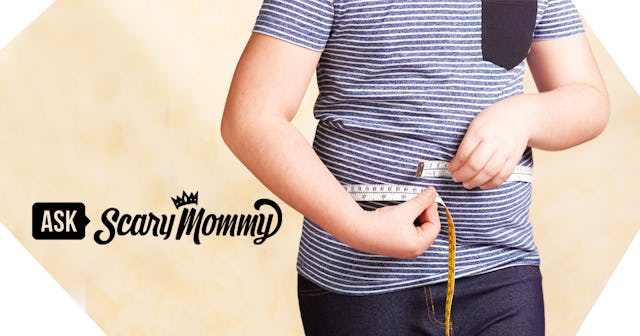Ask Scary Mommy: My Mom Talks About Diets And Weight In Front Of My Kid

Ask Scary Mommy is Scary Mommy’s advice column, where our team of “experts” answers all the questions you have about life, love, body image, friends, parenting, and anything else that’s confusing you.
This week… How do you handle it when grandma starts negging herself and talking about the importance of diets and maintaining her weight in front of your kids? Have your own questions? Email advice@scarymommy.com
Dear Scary Mommy,
I’m 40 years old and I have a 6-year-old daughter. My mother’s in her mid-60s and for as long as I can remember, she’s been hung up on her weight and trying every fad diet that comes her way. She projected a lot of her own unhappiness and insecurity onto me, and while I didn’t suffer terribly, I do have patterns of disordered eating. It’s also taken a decade of therapy to accept my body. I’ve been painstakingly intentional with how I approach food and talk about bodies with my daughter and it’s so important to me that she always has a healthy body image and relationship with food. Anytime my mom comes over, though, she pretty much always makes some remark about a new diet she’s doing, how she’s “watching” her weight, how she’s rejecting dessert because she hasn’t exercised, her metabolism “isn’t what it used to be,” etc. I know she’ll never stop, because she never has. It’s just ingrained in her and she doesn’t know how to not say things like that. But I also can’t have my daughter absorbing this the way I did. What do I do?
Generational cycles surrounding disordered eating and diet culture are suffocatingly prevalent. It’s almost impossible to escape unscathed from a cycle of toxicity like this, especially for females. But facts are facts: research shows that kids whose parents talk about weight are more likely to have negative feelings about their bodies and partake in unhealthy dieting behaviors. You, of course, are a testament to that, and I’m sorry for it.
Most of the research available about kids and diets focuses on children between the ages of 11 and 16, but we all know our relationship to our bodies and food starts much earlier. Some studies have shown that kids as young as 5 to 8 years old can have deep concerns about body image. A report from Common Sense Media found that more than half of girls and one-third of boys between ages 6 and 8 think their ideal weight is less than their actual weight. What’s more, by age 7, almost 25 percent of kids have attempted some type of diet.
It’s horrific. And your instincts and experience are spot-on: your daughter is aware of these things and will internalize it. You won’t be able to control all of it, but you can certainly curb your mom’s constant negging by confronting her about it. You don’t say whether you’ve ever confronted her before, but the fact that you’ve been in therapy for 10 years means you have the tools and knowledge to effectively do so. Confrontation doesn’t have to be loud or scary or mean-spirited. Think of it as you protecting your daughter the way no one protected you as a young girl.
Tell her when it comes to body image and food, you lead by example. It’s how kids learn. That means when she’s in your home or in your presence, she should try to follow suit. Saying something like, “I try to talk about food with joy and pleasure and encourage (your daughter) to try new things.” Tell her it’s important to you that she grows up focusing on the awesome things her body can do, and not what it looks like. That exercise isn’t a punishment for excess calories, but rather something that keeps us feeling good and active. The hard work you’ve put in with overcoming your own issues should not be dismissed. If she can’t meet you at least part of the way on this, then the only alternative where your child doesn’t develop a grandma-induced complex is by putting up proper boundaries until she can.
Fatphobia is a tale as old as time. Your mom was part of a generation where counting calories and drinking diet shakes was simply just “what was done” and that’s that. No one questioned it, and certainly no one tried to fix it. You can hold her accountable for what she says and does in front of your child without placing blame on her. She’ll likely feel defensive regardless, but if she truly loves you and her granddaughter, she’ll make an effort. If she doesn’t, I urge you to talk to your therapist about boundaries and figuring out what that looks like for you and your mom.
Have your own questions? Email advice@scarymommy.com